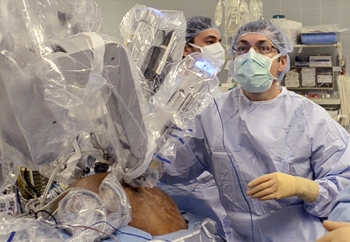May 16 2013
Obese patients who received robotic kidney transplants had fewer wound complications than patients who received traditional "open" transplant surgery, according to surgeons at the University of Illinois Hospital & Health Sciences System.
 UI Health surgeons provide new hope to obese patients previously denied access to kidney transplantation.
UI Health surgeons provide new hope to obese patients previously denied access to kidney transplantation.
The findings should allow more obese patients to receive kidney transplants.
Patients with a body mass index (BMI) greater than 35 who have end-stage kidney disease are often denied transplantation, and patients with a BMI over 40 often die on dialysis without an opportunity for transplant. Obesity "markedly increases the risk of wound infection, which lowers graft and patient survival," said Dr. Jose Oberholzer, chief of transplantation surgery at UI Hospital and lead author of the study, in the March issue of the American Journal of Transplantation.
Minimally invasive robotic transplantation may reduce health disparities for obese patients with end-stage kidney disease, according to the study authors.
Up to half of dialysis patients are obese, defined as having a body mass index greater than 30. Studies have shown that obese patients with chronic kidney failure wait longer for transplants and consequently have poorer outcomes than non-obese patients. However, obese transplant patients who don't have surgical site infections have similar kidney transplant success rates as non-obese patients.
A new life: robotic kidney transplantation at UIC
Obese patients often have diabetes and hypertension as a result of being overweight. Seventy percent of hypertensive dialysis patients and 75 percent of diabetic dialysis patients survive less than five years, previous research has shown.
UI Hospital surgeons have developed a new robotic technique that avoids any incision in the infection-prone lower abdomen and uses only a small incision above the belly-button.
Physicians identified 28 obese patients who received robotic kidney transplants at UI Hospital between June 2009 and December 2011. They followed the patients for six months after transplant and compared their outcomes with a group of 28 obese patients who received traditional "open" kidney transplantation at the hospital prior to 2009.
There were no surgical site infections in the robotic patients, while 29 percent of patients in the control group developed an infection. Measurements of kidney function, graft and patient survival were comparable in the two groups.
The robotic kidney transplant procedure provides "one of the best applications for robotic surgery, because it gives very high risk patients who are frequently bypassed for surgery an opportunity for a better quality of life," said Oberholzer, C.& B. Frese and G. Moss Professor of Transplant Surgery, Bioengineering and Endocrinology at UIC. "Without robotics, most of these patients would simply not be considered for transplantation."
The University of Illinois Hospital & Health Sciences System provides comprehensive care, education and research to the people of Illinois and beyond. The UI Health System includes a 495-bed tertiary hospital; the University of Illinois at Chicago colleges of Medicine, Dentistry, Pharmacy, Nursing, and Applied Health Sciences, the UIC School of Public Health and UIC’s Jane Addams College of Social Work; 22 outpatient clinics located in Chicago; 12 federally qualified health centers throughout the city; and College of Medicine and affiliated health care facilities in Urbana, Peoria and Rockford.